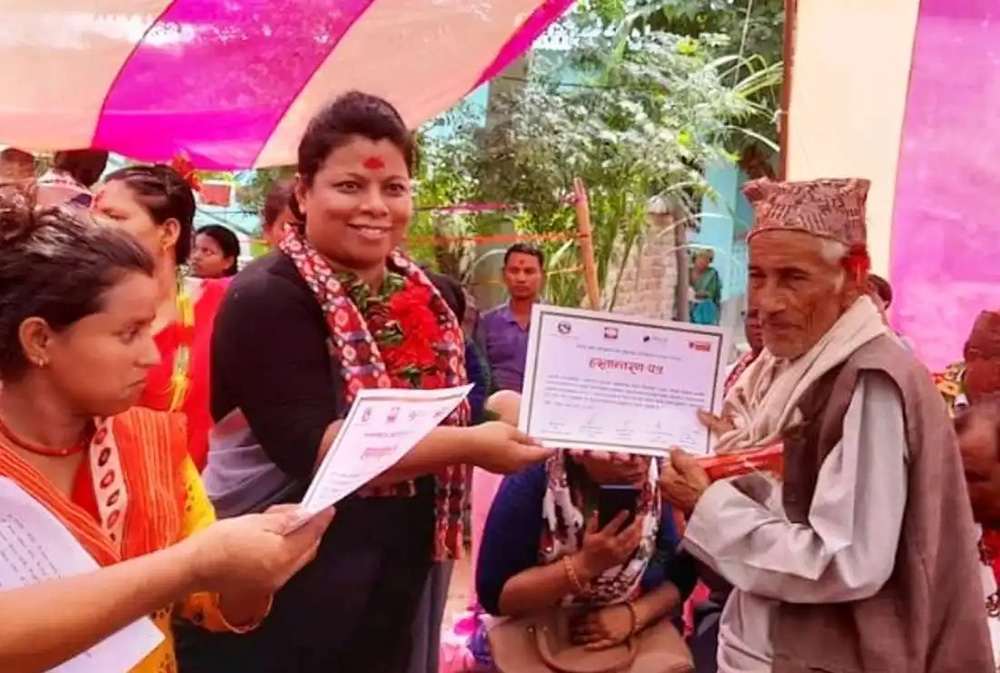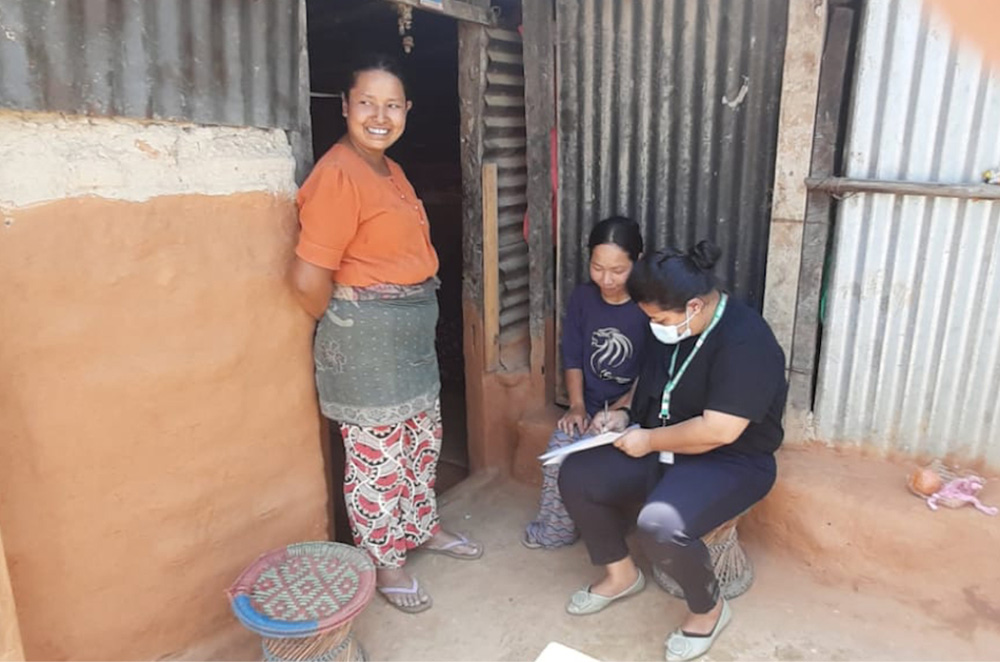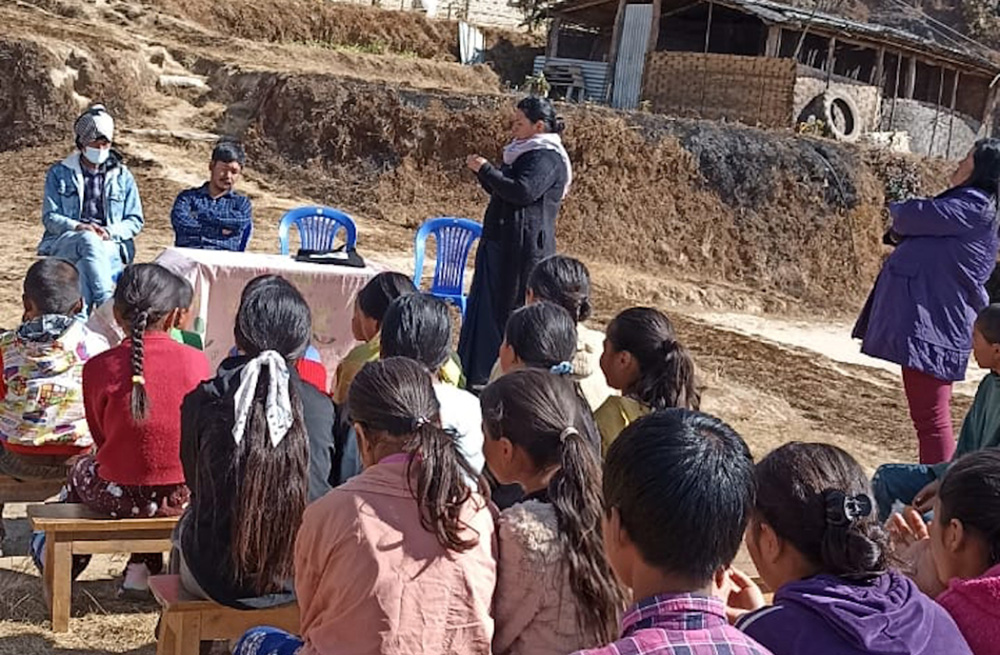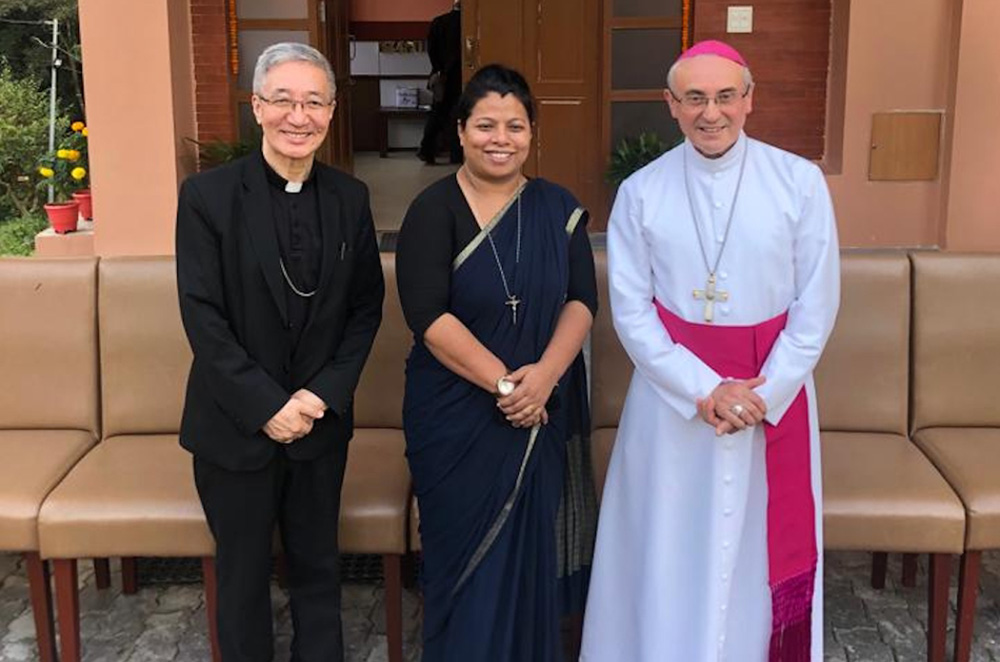
Sr. Durga Cecilia Shrestha (center), a member of the Sisters of St. Joseph of Cluny and the first woman executive director of Caritas Nepal seen at a program with beneficiaries. (Courtesy photo)
Growing up in a traditional Hindu family in an eastern Nepal village, Durga Shrestha never thought that one day she would become a Catholic nun and work for the welfare of her country's poor.
The 40-year-old now introduces herself as Sr. Durga Cecilia Shrestha, a member of the Sisters of St. Joseph of Cluny. She is also the first woman to become the executive director of the church's social service arm, Caritas Nepal.
Durga remembers growing up seeing her devout mother "following Hindu rituals and performing puja [worship]" at their home. One of them was Santoshi Mata Puja requiring strict fasting for 16 consecutive Fridays. A high-caste Brahmin priest would turn up on Fridays to perform elaborate rituals.
By the time she turned 10-years-old in 1993, Durga became conscious of caste differences among Hindus and the "unjust treatment of so-called untouchable Dalit people in the name of religion."
The Dalits were prohibited from entering temples and houses of the upper castes. The Brahmin priests would not interact with them at all.
Advertisement
The Shrestha surname literally meant "the first or perfect" in Sanskrit, the sacred language of Hinduism. It was also an epithet for the Hindu god Vishnu, the preserver and protector of the universe, and indicated her family's superior position in the caste order.
As a child, she noticed Catholic nuns and priests visiting an Indigenous Limbu family in the neighborhood and was "fascinated by their simplicity and show of affection" to everyone, without any discrimination.
The nuns were "soft-spoken and happy-looking humans" and were "friendly with people of all ages, from children to the elders, and especially the sick."
"I used to observe them out of curiosity and wonder why the Brahmin priests kept away from the Dalits and tribal people," she recalls.
She felt herself drawn to the nuns and their kindness towards all humans.
"I wanted to be like them, though I didn't know who Christ was or what Christianity meant," Shrestha says.
She and her younger sister "loved talking to the Catholic sisters" whenever they visited their village and wanted to know more about their faith. She even got a poster of the Virgin Mary and wanted to place it in her room. But her parents objected.
"If you want to follow Christianity, you have to live separately," threatened her father, who served in the Indian army and visited them during holidays.

Cluny Sr. Durga Cecilia Shrestha visits women in a village in Nepal to collect details of women as part of a project. (Courtesy photo)
Then tragedy struck. Her paternal uncle lost his only daughter despite following all the rituals including visiting temples and sacrificing animals to cure her.
Soon her uncle fell sick and announced that he was no longer a Hindu and was converting to Christianity.
There was utter chaos in the family. "Our relatives said my uncle had gone mad," she recalled.
But then, all of a sudden, her father came out in support of his brother and said he also was becoming a Christian.
Still young and in mourning, she was nonetheless happy that her family was going to become Christian and she could see the nuns and priests more often.
In 1996, the Shrestha family became Christians "bringing in a lot of calm and peace afterward," she says.
The three Catholic families, including hers, faced discrimination in their Hindu-majority village of around 200 households.
The upper caste Hindu families would not allow their children to play with the Catholic children. Shrestha's grandfather prevented them from entering his house and began treating them as "untouchables."
"The friends with whom I used to go to school and play began avoiding me," she recalled.

Cluny Sr. Durga Cecilia Shrestha (standing in front of the table) helps conduct a class for young children in a remote village in Nepal in this undated picture. (Courtesy photo)
However, this didn't deter the Shrestha family who regularly attended church for Sunday Mass.
She was admitted to a school run by the Sisters of St. Joseph of Cluny, who had started their mission in Damak, East Nepal, in the early 1980s.
While studying in 12th grade, she began experiencing a dilemma — whether to become a nun or choose married life.
Unable to decide, she told herself she would join the nunnery if she passed her exams. If she failed, she would accept one of several marriage proposals coming her way as was the tradition among her people.
"But God had a plan for me. I passed the exams. I took it as a blessing from him and decided to work for others," she said.
At the age of 19, Shrestha joined the Sisters of St. Joseph of Cluny and was sent to Kalimpong in India to live with the community and prepare herself for the life of a nun.
During training, she worked in Kalimpong to save children from becoming child laborers.
Three years later, at the age of 21, she completed her novitiate and took her vow as a Cluny nun.
Back in Nepal in 2008, she graduated in social work in Kathmandu and went back to Kalimpong to work as a helpline coordinator under the Ministry of Women and Children.
For the next four years, she worked for the betterment of child laborers and their families by rescuing, rehabilitating, and providing education to them. "It was a fulfilling experience as a social worker," she recalled.

Cluny Sr. Durga Cecilia Shrestha (center) poses for a photograph with the Apostolic Vicar of Nepal Bishop Paul Simmick (right) and senior priest after she was appointed executive director of Caritas Nepal in June 2023. (Courtesy photo)
In 2016, Shrestha took her final vows as a Cluny nun. A year later, she returned to Nepal to work in the mission of her congregation.
Her dedicated work for underprivileged and marginalized women and children led her to become a board member of Opportunity Village Nepal, a non-governmental organization run by the Good Shepherd nuns. She went on to become its director.
"It was a turning point for me as I was exposed to the plight of underage girls and young women being trafficked both within the country and outside," Shrestha said.
In June 2023, the nun became the first woman in South Asia to head a national unit of Caritas as executive director of Caritas Nepal.
Bishop Paul Simmick, the apostolic vicar of Nepal, sees her appointment as "a genuine desire in the church to see women in leadership positions."
"We need to have women at the highest levels of our governance and strive towards gender equality at all levels," he said.
Caritas Nepal was established in 1990 and the top post was always held by men, mostly priests. It was no different in other South Asian nations, where it has had a presence for over five decades.
"This is a big recognition for me and all other aspiring women, who want to showcase their talent and work towards the welfare of communities," Shrestha said.
Caritas Nepal currently has six women in senior managerial positions but the nun wants more women to join the church agency.
"The majority of the beneficiaries of our projects are women. The goal is to see more capable women leading the projects at the grassroots level," she explained.
And yet, the fact remains that in the patriarchal societies of South Asia, people still struggle to accept that women can be leaders.
"We need to change that notion," said the nun.
For her achievement, Shrestha credits God and his plan for her and church leaders for "showing commitment to achieving gender equality."
"I am happy whenever the donors say in our first meeting that it is good to see a female heading an organization. That's a big encouragement," she adds.





